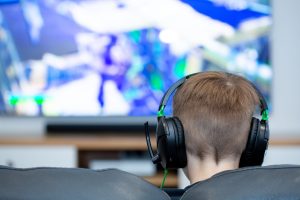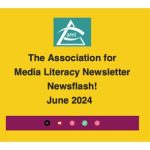How Technology Can Bring Us Together
One of the most common questions I am asked as an educator by families I work with is about how much screen time is too much screen time. While I am not an expert in this area exclusively I wanted to highlight some resources that might be helpful to families in navigating this space. I would also like to acknowledge that families come in diverse forms and what works in space may not in another.
*Photo Courtesy of Unsplash
Recently Neil Andersen, President of the Association for Media Literacy, and I had the opportunity to talk with media scholar, educator, innovator, and strategist Dr. Faith Rogow on the Mediacy Podcast in a special episode titled Media Literacy in The Early Years. Dr. Rogow had some excellent tips for responding to families about children’s use of technology and “screen time”. In the conversation, Dr. Rogow pointed out that the term “screen time” sometimes becomes the focus for families because “…it is easy to measure” (e.g., “my child uses a tablet for two hours each day”). However, Dr. Rogow reminded us that what kids are doing on the screens is more important than the amount of screen time. In her book Media Literacy for Young Children Teaching Beyond the Screen Time Debates (2022), Rogow points out that educators can talk with families about the topic of technology usage “… but ultimately families should always decide for themselves” (Rogow, 2022, p. 121). In the Mediacy Podcast Rogow also noted that families can pay attention to what children are doing on screens and always have families ask themselves, “Why do I think screen time is a problem?” Asking why is really the work of media literacy because asking why helps us to use media in healthy and thoughtful ways. For more great tips for families check out the latter part of the Mediacy Podcast episode Media Literacy in The Early Years.
Another resource families might want to check out is Professor Sonia Livingstone at the London School of Economics who has been researching and thinking about children and media usage for a number of years. Livingstone has a blog titled “Parenting for a Digital Future A blog about growing up in a digital world”. In a recent blog post on the site, researchers examined how digital technologies in families can support family well-being – parents and caregivers can be role models for their children and that using digital technologies with the family can have positive effects (Kapella, Schmidt, and Vogl, 2022).
Although I would not consider myself a “gamer” when my son and I have time to play Mario Kart together it gives us time to connect and he and I can practice skills like cooperation, communication, and patience (mostly because I am always in the last place despite the tips he gives me). It’s also a time for me to enter his world and play. This practice is not unfamiliar to me as an early years educator where we are trained to listen and respond to play in order to co-create learning experiences. danah boyd writes that, “understanding the affordances of a particular technology or space is important because it sheds light on what people can leverage or resist in achieving their goals” (boyd pp. 10-11, 2014).
How might families then leverage the affordances of technology to connect? It could be as simple as watching a favorite show together and then talking about it afterward, or creating a short slideshow of a recent family outing or event (e.g., a day at the park, birthday celebration), and together parents and caregivers might narrate or type short captions about the outing. Instead of thinking about how technology divides us, let’s look for opportunities where we might leverage technology to connect us, even if that means losing every game of Mario Kart!
References
Attwell, Chelsea and Andersen, Neil. (Host). (2023). Mediacy: Media Literacy in the Early Years. VoicEd Radio.https://voiced.ca/project/mediacy/.
Boyd, Dana. (2014). It’s Complicated: the social lives of networked teens. Yale University Press.
Kapella, Olaf., Schmid Maria, Eva and Vogl, Susanne. (2022, May 18). Re: Integration of digital technologies in families with children aged 5-10 years. https://blogs.lse.ac.uk/parenting4digitalfuture/2022/05/18/technology-and-young-children/
Rogow, Faith. (2022). Media Literacy For Young Children Teaching Beyond The Screen Time Debates. National Association for the Education of Young Children.
Stoilova, Mariya.. (2021, August 4). Re: Parenting for a Digital Future: summer 2021 roundup. https://blogs.lse.ac.uk/parenting4digitalfuture/2021/08/04/summer-2021-round
*Feature Image Courtesy of https://unsplash.com/photos/0gNzcMqd0sw?utm_content=creditShareLink&utm_medium=referral&utm_source=unsplash




